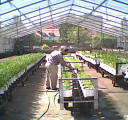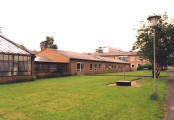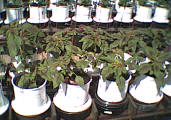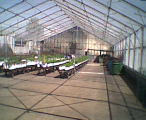|
Influence of
dielectric heating on quality of rape and sunflower seeds
This study was done to investigate the
influence of dielectric heating using microwaves and radio
frequencies at different levels of duration and temperature on the
moisture content, qualitative characteristics, antioxidant
properties and proteins of rapeseeds and two varieties of sunflower
seeds with different fatty acid composition. The aim was to find the
optimal dielectric heating conditions in order to obtain high
quality of oil-seeds and more oxidative stability. Three experiments
were conducted using two experimental microwave applicators and one
experimental radio frequency applicator. Seeds of two sunflower
varieties, i.e. high linoleic and high oleic acid varieties, were
used and one cultivar of rape-seed, which served as standard.
Different quality indicators were analysed. Untreated seeds were
used as control.
In the first experiment, the influence of temperature of microwave
heating on quality parameter of rape and sunflower seeds was
investigated. For part of this experiment linoleic sunflower seeds
were dehulled to study the effect of dehulling on the influence of
microwave heating on the quality of the oilseeds and their extracted
oils as well as oil content, in comparison to hulled seeds.
The obtained results revealed a significant influence of microwave
heating on some quality indicators of oilseeds. As temperature
increased, the moisture content of seeds was significantly reduced.
In comparison to hulled seeds, dehulling of linoleic sunflower seeds
led to the reducing of the moisture content at temperatures 90 and
110 °C without burning of the seeds. The increase of acid and
peroxide values of extracted oils from high oleic and linoleic
sunflower seeds, which are two of the main indicators of the
occurrence of rancidity of oilseeds, was significantly prevented
until 70 °C, indicating a high oxidative stability of the heated
seeds. The extracted oils from dehulled linoleic sunflower seeds had
lower acid and peroxide values in comparison to hulled seeds. The
extracted oils from rapeseeds had lower oxidative stability as shown
by their acid and peroxide values. Microwave heating at temperatures
of 90 and 110 °C led to higher acid and peroxide values of extracted
oils from all studied seeds but their phospholipids contents were
not significant changed under these conditions. Slight increase of
the seed oil content was obtained with increased temperature.
Moreover, dehulling of linoleic sunflower seeds facilitated
significantly the extractability of the oil in comparison to hulled
seeds. No significant influence on the activity of LOX, whereas the
activity of PLD was significantly declined. The influence of
microwave heating on the antioxidant properties of heated seeds was
also investigated. Microwave heating had a significant influence on
the activity of APX, which was enhanced with increased temperature
in each of high oleic, hulled linoleic and dehulled linoleic
sunflower seeds. POX is one of the most important indicators of
lipid oxidation because of its heat stability. Increased temperature
significantly reduced POX activity of the seeds. The total
antioxidant capacity of the heated seeds did not changed
significantly, although dehulling of linoleic sunflower seeds
resulted in a significant increase of the antioxidant capacity
compared to hulled seeds. Protein solubility of the studied seeds
was increased significantly until 70 °C, and then it was reduced
gradually at higher temperatures.
In the second experiment, the influence of duration of microwave
heating as well as the increase of internal temperature depending on
the duration of microwave heating on quality of rape and sunflower
seeds was investigated. Increased duration had less influence on the
quality of studied seeds compared to the temperature. Acid and
peroxide values of high oleic and linoleic sunflower oils increased
as expected with increasing duration. In rapeseed oil, acid and
peroxide values were reduced. The activities of LOX and PLD of the
seeds fluctuated without clear trend. No change in protein
solubility of sunflower seeds was detected, whereas it was increased
in rapeseeds. The antioxidant properties, mainly the activities of
seed SOD and APX, were not significantly changed whereas POX
activity was significantly increased. Moreover, no significant
change in oil content of heated seeds was obtained but phospholipids
content of extracted oils changed significantly.
In the third experiment, the influence of temperature of radio
frequency heating on quality of rape and sunflower seeds was
investigated.
In comparison to microwave heating, radio frequency temperatures of
90 and 110 °C did not caused any over drying of the seeds. Moreover,
an increase of acid and peroxide values in the extracted oils from
linoleic and high oleic sunflower seeds were prevented at these
temperatures indicating a higher oxidative stability of the heated
seeds. That might be related to deactivation of the lipid degrading
enzymes, mainly lipase, LOX and POX. In contrast, rapeseeds oils had
lower oxidative stability and their acid and peroxide values were
increased. Furthermore, radio frequency heating led to a significant
reduction of POX activity of the seeds. No significant change was
obtained on LOX and PLD activities of the seeds, except a
significant reduction of PLD activity of rapeseeds. A slight
increase of oil content of the seeds was obtained, whereas
phospholipids content of their extracted oils was not changed. No
significant influence on protein solubility of high oleic and
linoleic sunflower seeds was ascertained, whereas it was
significantly reduced in rapeseeds. Moreover, radio frequency did
not affect the total antioxidant capacity as well as the activities
of SOD and APX in the studied seeds.
Finally, the obtained results revealed a significant influence of
dielectric heating using microwave and radio frequencies on quality
indicators of oilseeds. Some of the chemical and biochemical as well
as the antioxidant properties of rape and sunflower seeds, the
oxidative stability, protein solubility, oil content and quality of
extracted oils were improved and the activities of oxidative and
lipid degrading enzymes were inhibited, when the seeds were heated
until 70 °C as well as when heated for five minutes at almost 70 °C.
Through radio frequency treatment, the seeds could be heated at 90
and 110 °C without over drying. |











